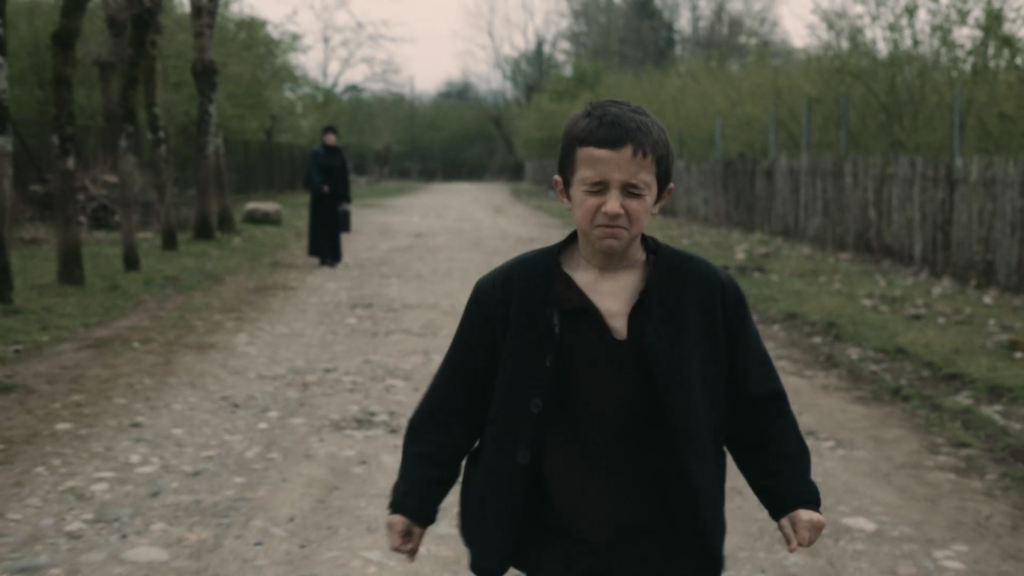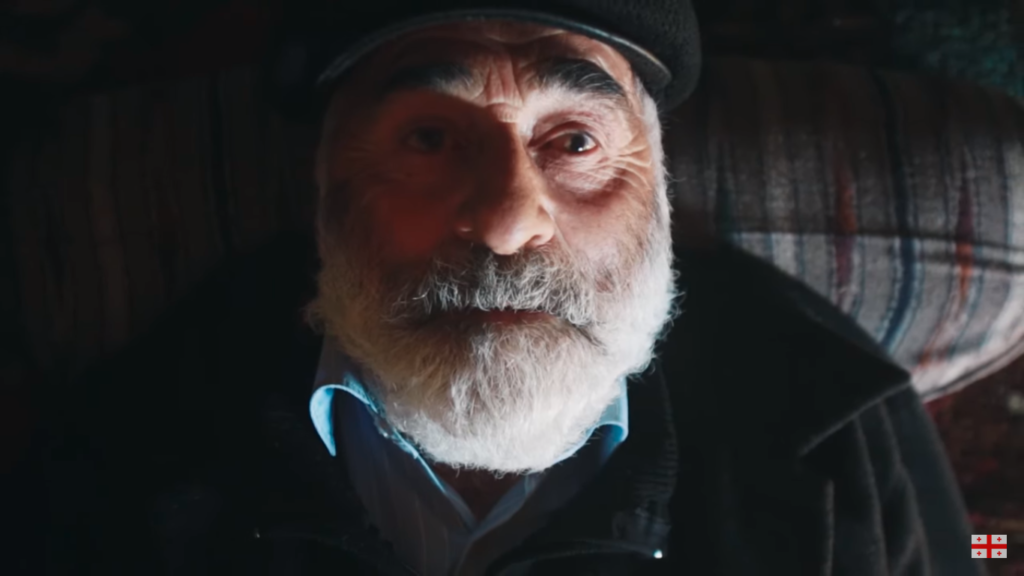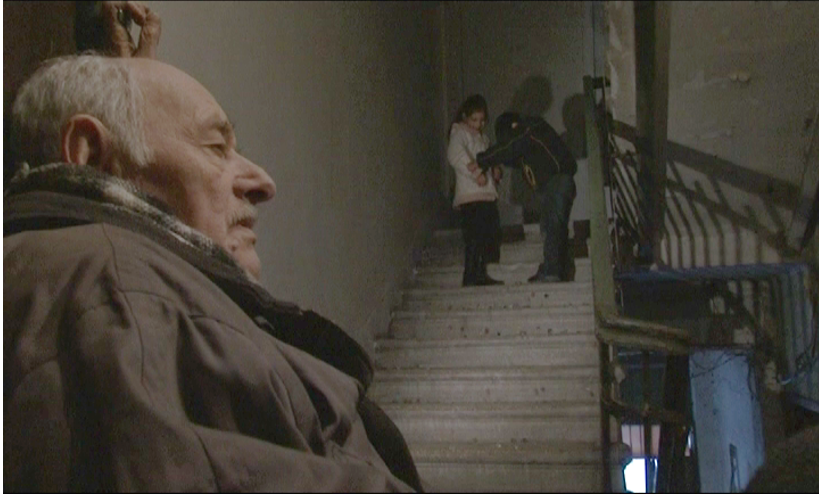Screenings have always attracted viewers’ attention and are still very popular among movie audiences. This is logical – people are interested how directors will be able to portray their favorite novels, stories, characters' adventures on the screen. Based on such high expectations among the audience, of course, even greater responsibility falls on the director and his film crew, since there is more criticism of the film from the public and it is to be expected. The risk is high, and the chance that the director will fail to live up to the audience’s expectations and turn his favorite work into one big disappointment is real.
Giorgi Menabde's graduation student work, the short film "Blood" (2018) is Nodar Dumbadze's story screen adaptation based on the same name and directed and written by himself. In general, it is a difficult task for a young director to manage and convey the heartfelt and emotional story narrated by Dumbadze, as always, on the screen as deeply and interestingly as it is given in the original itself. Unfortunately, in this regard, the film did not live up to expectations. Although everything in the script is meticulously repeated, due to the actors’ overly artificial performance, the film has little or no ability to make an emotional connection with the audience. Despite the slight change of the plot by the director at the beginning of the film and immediately at the end, the middle part, where the main story unfolds, is so similarly copied from the story that it becomes very boring to watch. Moreover, the characters’ text literally follows Nodar Dumbadze’s phrases and the actors repeat these phrases very emotionlessly, artificially, by heart. All this leaves the association of the performance more than the film. But of a poorly staged one.
Actors utter sentences, but they do not try at all to grasp these words, enter the role, feel something, or at least make the audience feel it. Their game is very superfluous. Little Nodar's Imeretian grandmother – Yulia Mikeladze (Nino Jugheli), Gurian grandfather – Kishvardi Lomjaria (Jemal Kechakmadze) and the little boy himself – Nodar (Luka Matitaishvili) seem to be trying to get out of the background and revive their mediocre game with the help of this West Georgian dialect but to no avail. Relatively believable is the expression on Nodar's face and his childishly confused, saddened, constantly wide eyes, with which his emotions can be read.
If we put the acting game aside for a while, it is possible to assume that the film is well created in one way or another. The composer Levan Basharuri's music is worth noting, which creates a very good emotional background in those episodes where there are no dialogues. The film is also filled with many beautiful shots, often alternating between general, medium and close-ups. The camera is mostly static, although there are moments where it becomes more mobile. For example, in the scene where crying Nodar is running. The agitated boy starts running in the direction of the screen, and the camera moves shakily. In addition, it often moves in parallel with the characters’ movement. And in the scene where Nodar begins to think about his grandmother, the cameraman uses a zoom device on his face and gradually zooms in on the expression of a thoughtful child, which makes it easier to understand the boy's inner confusion and tension. Considering all this, it can be said that the cameraman’s work is satisfactory.
The director might not have thought much about the title and decided to keep the same title for his film. It is quite possible that the title "Blood" at first arouses different expectations in the viewer. It is easy for him to associate this title with murder, bloodshed, or something similar, especially when the film begins with a rather chilling shot – how a crying boy is running, accompanied by chilling music and a non-standard, chaotically moving camera. It should be noted that opening the film with this shot was quite an advantageous decision. Because, in this way, the director intrigues the audience from the very beginning and makes them more interested in what to expect from him.
Logically, the first thing you think when you see Nodar is that something terrible has happened to him, something has scared him and he is running away from it with all his might. However, at the end of the film, we learn from the grandfather's words that the boy is not running away from something, but conversely, he is running towards something. He runs towards the invisible force that strangely attracts him but he does not fully understand what this mysterious powerful force is. At the beginning, when Nodar comes from his grandmother, we hear his thoughts, where he can't hide his surprise, he can't understand why he doesn't run away from the unknown man, who turns out to be his grandfather, and why he doesn't go back to his grandmother, who reminds him so much of his mother. What is it that connects the boy with Kishvardi? He cannot run, even though the way is open. At the end of the film, the reason for Nodar's attachment to his grandfather becomes known to the audience. The reason turns out to be blood, the blood that boils in the veins of both of them. Therefore, the title "Blood" does not refer to any terrible crime, but to kinship. As Nodar Dumbadze initially, Giorgi Menabde also wants to show us the influence of kinship and how blood can connect two people who are almost completely unknown to each other by some strange, invisible force.
Giorgi Menabde's attempt to change the author's primary source in his own way is also interesting. In the film we can see several scenes that are not mentioned at all in the story. At the beginning and end of the film, the director shows the future, modern time, where a well-known the old man and his son can be seen. From the way the young man talks, it is easy to understand that he is going to sell the house, the very house with which his grandfather has so many fond memories. After the grandfather (it shouldn't be hard to guess that this old man, also played by Jemal Kechakmadze, is Nodar) takes a very dusty, aged photo album from a drawer in an old, abandoned house and stares at one torn photo with teary eyes, the audience joins him in his memories. And in the last scene, when we return from the past to the future, the old man lies on the sofa, happy and at the same time sad and leaves the world with his eyes wide open.
The director's effort is commendable. You might even say interesting because at least there's something different about this episode. However, the final scene still leaves the audience with a sense of loss. The director probably wanted so much to shoot something different, something that would at least slightly distinguish his film from the story, that this desire made him completely forget to pay more attention to the script itself – the son sells the old man's house full of memories, and in this house he dies before the buyer arrives. One gets the impression that with this artificial episode, the director tried to easily "pull himself out" and make the plot of the film more engaging in a specific way. It is clear that the purpose of such an ending was to arouse sentimental feelings in the audience, although it is doubtful how well it managed to do so.
Elene Tsagareishvili







